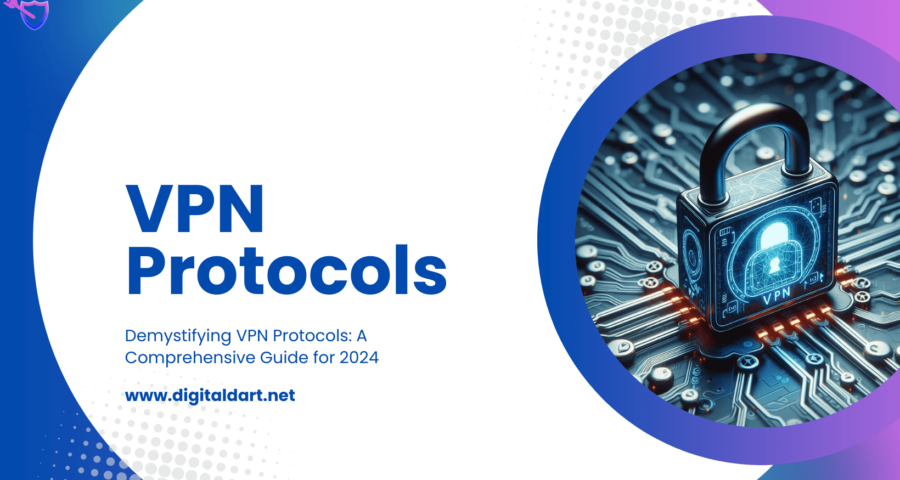In today’s digital age, where online security is paramount, Virtual Private Networks (VPNs) have become an integral tool for safeguarding our digital footprint. Among the key components that make VPNs effective are the protocols they use. In this comprehensive guide for 2024, we will delve into the world of VPN protocols, demystifying their complexities and shedding light on the latest advancements in the field.
Introduction to VPN Protocols
In a rapidly evolving cyber landscape, understanding VPN protocols is crucial for anyone looking to secure their online presence. VPN protocols act as the foundation for establishing secure connections, ensuring data privacy, and safeguarding against cyber threats.
Understanding VPN Protocols
What are VPN Protocols?
VPN protocols are sets of rules that govern how data is transmitted between devices over a VPN connection. They play a pivotal role in ensuring the confidentiality and integrity of data through encryption and tunneling processes. As we navigate through the complexities of VPN protocols, it’s important to keep in mind their evolving significance in 2024.
Importance in 2024
In an era where cyber threats are more sophisticated than ever, VPN protocols play a crucial role in adapting to the changing landscape. They serve as a shield against potential security breaches, making them indispensable for maintaining user privacy in the digital age.
Common VPN Protocols
OpenVPN
OpenVPN stands out as a widely used and trusted protocol due to its open-source nature. With community support and continuous development, it provides a robust and flexible solution for secure communication over the internet. Its adaptability and transparency make it a go-to choice for many VPN users.
L2TP/IPsec
Layer 2 Tunneling Protocol with IPsec combines the strengths of both protocols to deliver a secure and efficient VPN connection. While it may not be as fast as some alternatives, its compatibility with various devices and platforms makes it a reliable choice for certain use cases.
IKEv2/IPsec
Internet Key Exchange Version 2, paired with IPsec, is known for its speed and security. This protocol is particularly suitable for mobile users, as it seamlessly handles changes in network connectivity, making it ideal for users on the move.
SSTP
Secure Socket Tunneling Protocol is a Windows-centric option that provides a secure connection over the SSL channel. Its integration with Windows operating systems makes it a convenient choice for users within the Microsoft ecosystem.
Emerging VPN Protocols in 2024
WireGuard
WireGuard is a relatively new and innovative VPN protocol designed for simplicity, efficiency, and improved security. It was created by Jason A. Donenfeld and initially released in 2016. WireGuard has gained attention and popularity for its minimalistic approach to VPN implementation.
Key Features:
Minimalistic Design:
WireGuard boasts a minimal codebase, making it easier to audit and maintain.
Its simplicity contributes to faster performance and efficient use of system resources.
Modern Cryptography:
WireGuard uses state-of-the-art cryptographic primitives to ensure the confidentiality and integrity of data.
The use of advanced encryption algorithms enhances security without compromising speed.
Dynamic Routing:
WireGuard allows for dynamic routing, making it adaptable to changes in network conditions.
This feature is particularly useful for users who frequently switch between different networks, ensuring a seamless and uninterrupted connection.
QUIC Protocol
QUIC (Quick UDP Internet Connection) is a transport layer protocol developed by Google to improve the performance of internet communication. Initially designed as a replacement for the traditional TCP (Transmission Control Protocol), QUIC operates over UDP (User Datagram Protocol) and has evolved into a versatile protocol with applications beyond web browsing.
Key Features:
Reduced Latency:
QUIC aims to minimize latency by combining the functionalities of multiple traditional protocols into a single, streamlined protocol.
The reduction in latency enhances the responsiveness of online applications and services.
Connection Multiplexing:
QUIC supports multiplexing, allowing multiple streams of data to be transmitted simultaneously over a single connection.
This feature optimizes resource utilization and contributes to improved performance.
Improved Security:
QUIC integrates encryption by default, providing a secure communication channel between clients and servers.
The encryption helps protect data from eavesdropping and tampering, enhancing overall security.
Adaptability:
QUIC is designed to adapt to changing network conditions seamlessly.
Its ability to handle packet loss and quickly recover from network disruptions makes it well-suited for real-time applications.
Choosing the Right VPN Protocol
Factors to Consider
Selecting the right VPN protocol involves considering factors such as speed, security, and compatibility. Users should evaluate their specific needs, whether it’s streaming, online gaming, or secure business communication, to choose a protocol that aligns with their requirements.
Best Practices for 2024
As technology evolves, so do the best practices for VPN protocols. Regularly updating software, staying informed about the latest security features, and adapting to emerging technologies are essential for maintaining optimal VPN performance in 2024.
Conclusion
In conclusion, navigating the world of VPN protocols requires a nuanced understanding of the options available and the specific needs of users. As technology continues to advance, choosing the right protocol becomes increasingly important for ensuring a secure and efficient online experience.
Ready to secure your online presence in 2024? Consider the services of Digital Dart VPN. Our expertly crafted VPN solutions prioritize your privacy and security, offering a seamless and reliable online experience. Take the next step towards digital safety by choosing Digital Dart VPN today.
In this ever-evolving digital landscape, staying informed about VPN protocols is the key to maintaining a secure online presence. Whether you’re a casual user or a business professional, the right VPN protocol can make all the difference in safeguarding your data.


Leave a Reply